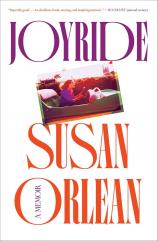Reading Group Guide
Discussion Questions
Joyride: A Memoir

1. In the introduction, Susan Orlean says she has had “the most wonderful life, a joyride of a life ” (page 5). She has built an inimitable body of work and a wonderful life for herself, but she’s also experienced disappointments and betrayals. Does a life well-lived include the tough moments? Can a “joyride” include both joy and pain?
2. Orlean’s approach to interviewing is one without preparation, preferring to jump in blind rather than study a subject or individual at length prior to engaging with them. How did this tactic work to her advantage?
3. What does a typical Saturday night look like for you? How do you think your experiences fit Orlean’s concept --- that Saturday nights are significant and mean something different to everyone?
4. Orlean has roamed across the country and around the world interviewing thrilling subjects. However, she also has played in her own backyard and spent time investigating the lives of “ordinary” people. Which of these kinds of stories appeal more to you? Are you drawn more to digging into the everyday, or to the unusual, striking and extraordinary?
5. What experiences that Orlean had as a journalist in the field sound most exciting or fulfilling to you? Any that you could imagine yourself taking part in?
6. What did you learn about the writing process from Orlean?
7. As a journalist, Orlean was “always positioned...as the narrator, a few steps offstage, rather than being the subject” (294). Are there ways in your own life where you find yourself to be a guide rather than an actor, and do you find it as satisfying as Orlean does? Can you relate to her initial discomfort about positioning herself as the main character of this book?
8. Orlean gives a behind-the-scenes look at what it’s like to work for large publications like The New Yorker, as well as what it’s like to publish a book. Did anything about the writer’s life or the publishing world surprise you?
9. Orlean refers to a Senegalese expression used when someone has died, expressing that through their death, their library has burned. She reflects that “the way our mind and memory function is library-like, a storehouse of individual volumes, each containing a thought or a dream or a memory or a sliver of knowledge” (265). What stories are in your library? Which ones are in your core collection?
10. How would you characterize Orlean’s storytelling? What tactics does she use to draw the reader in?
11. Orlean has lived all around the U.S., from Ohio to Oregon, New York to California. How did each of these places shape her as both a person and a writer?
12. In her conclusion, Orlean shares a piece of editing advice she got at The New Yorker, that asks her to abandon a final summary at the end and leave the reader “to complete the piece in his or her own head” (296–97). Do you think that’s an effective way to end a story? What do you find to be the most satisfying endings? Is an ending being satisfying the most important thing?
Joyride: A Memoir
- Publication Date: October 14, 2025
- Genres: Memoir, Nonfiction
- Hardcover: 368 pages
- Publisher: Avid Reader Press/Simon & Schuster
- ISBN-10: 1982135166
- ISBN-13: 9781982135164







